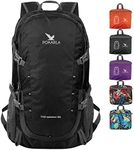Buying Guide for the Best Camping Backpacks
Choosing the right camping backpack is crucial for a comfortable and enjoyable outdoor adventure. The right backpack will not only fit all your gear but also distribute the weight evenly, making it easier to carry over long distances. When selecting a camping backpack, consider the type of trip you are planning, the duration, and the gear you need to bring. It's important to try on different backpacks to see which one feels most comfortable and suits your needs best.CapacityCapacity refers to the volume of the backpack, usually measured in liters, and determines how much gear you can carry. This is important because it needs to match the length and type of your trip. For a day trip, a backpack with a capacity of 20-30 liters might suffice. For a weekend trip, consider 30-50 liters, and for extended trips, 50 liters or more may be necessary. Choose a capacity that fits your trip duration and the amount of gear you need to carry, ensuring you have enough space without overpacking.
Fit and ComfortFit and comfort are crucial for a backpack, as you'll be carrying it for extended periods. This includes the size of the backpack, the adjustability of the straps, and the padding on the shoulder straps and hip belt. A well-fitting backpack will distribute weight evenly across your body, reducing strain. Backpacks come in different sizes, often based on torso length, so it's important to measure your torso and try on different sizes. Look for adjustable features that allow you to customize the fit to your body shape and size.
WeightThe weight of the backpack itself is important because it adds to the total load you will carry. A lighter backpack can make a significant difference, especially on long hikes. However, lighter backpacks may compromise on features or durability. Consider how much weight you are comfortable carrying and balance it with the features you need. If you plan on carrying heavy loads, a slightly heavier backpack with better support might be more comfortable.
Material and DurabilityThe material and durability of a backpack determine how well it can withstand the elements and rough handling. This is important for ensuring your backpack lasts through multiple trips. Common materials include nylon and polyester, with higher denier counts indicating more durability. Consider the type of terrain and weather conditions you will encounter. If you expect rough conditions, opt for a more durable material. Also, look for water-resistant or waterproof features if you anticipate wet conditions.
FeaturesFeatures of a backpack can enhance your camping experience by providing convenience and functionality. These include compartments, pockets, hydration reservoir compatibility, and attachment points for gear. Consider what features are important for your trip. For example, if you need quick access to certain items, look for a backpack with multiple pockets. If you plan to carry a hydration system, ensure the backpack is compatible. Choose features that align with your specific needs and preferences.

















